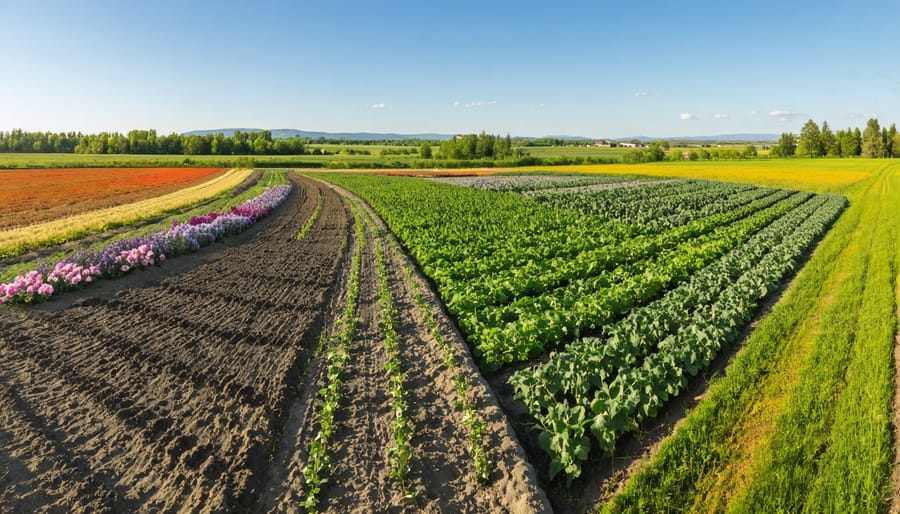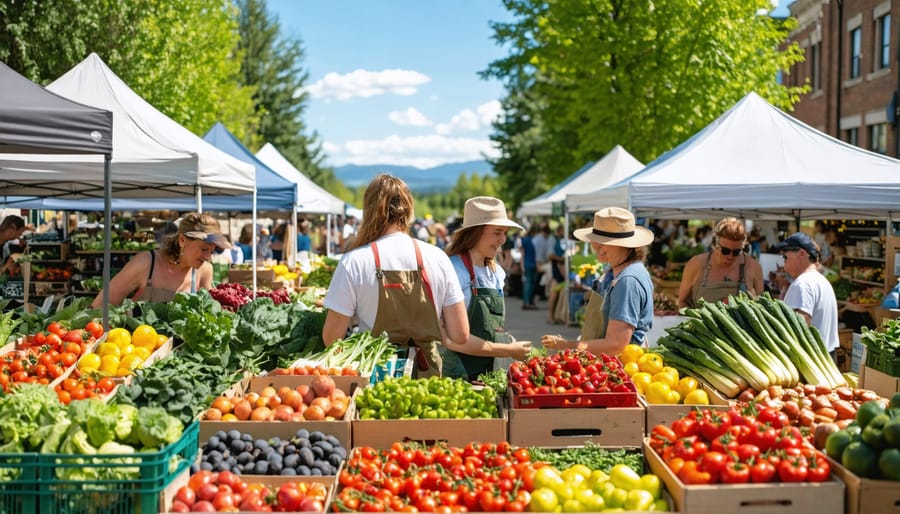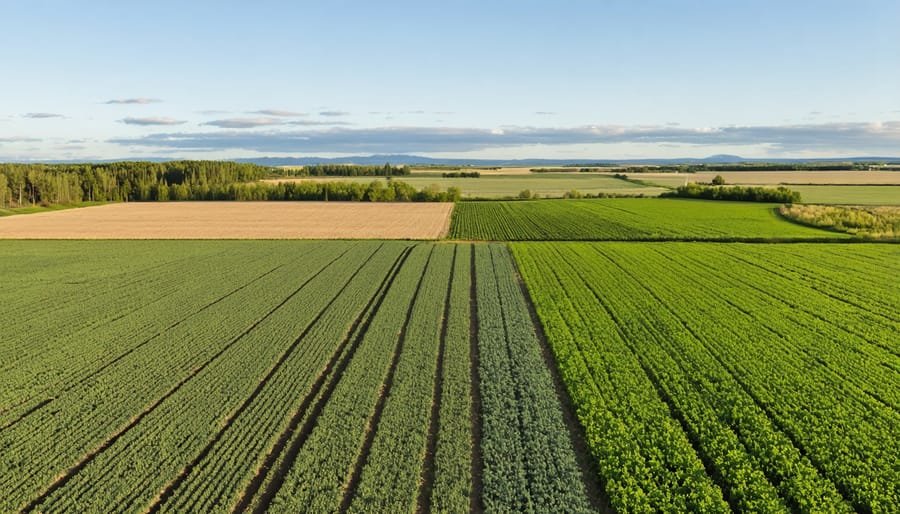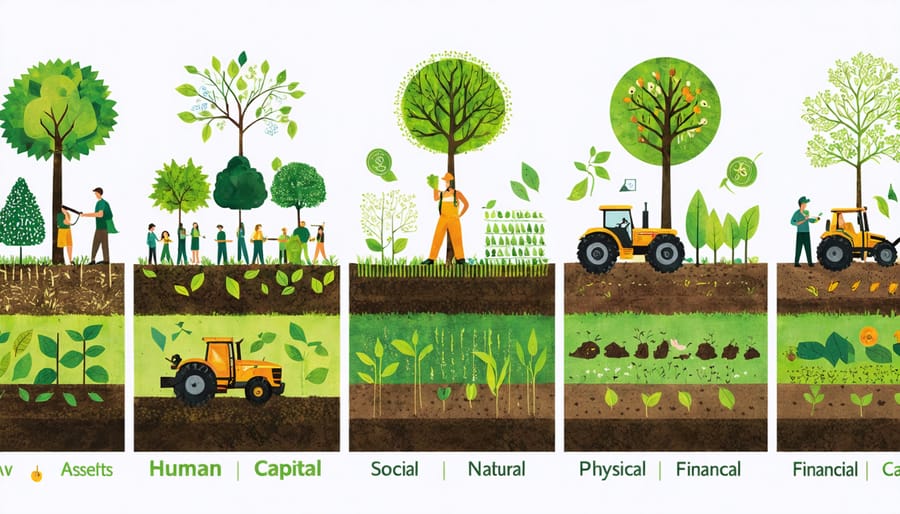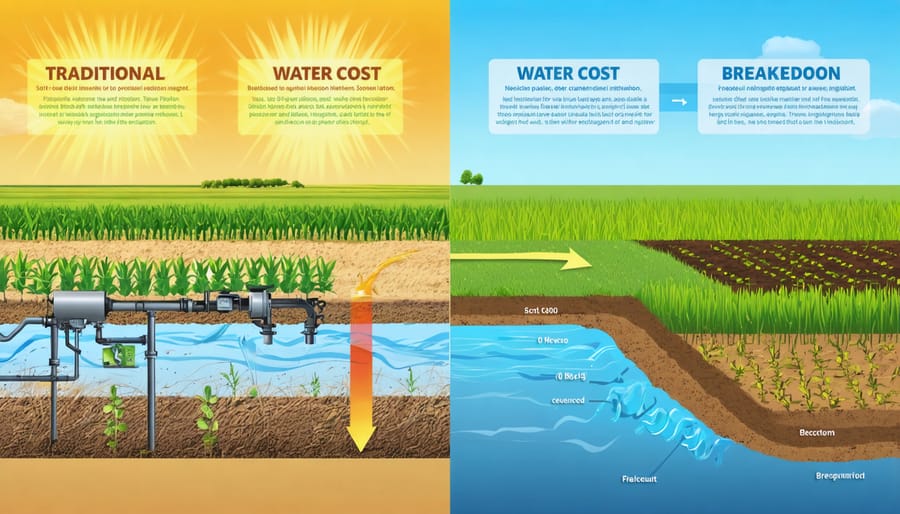Agroforestry careers represent one of the fastest-growing sectors in sustainable agriculture, combining traditional forestry with regenerative agriculture practices to create diverse, rewarding career paths. From forest management specialists earning $65,000-85,000 annually to agroforestry consultants commanding $90,000+, the field offers compelling opportunities for both experienced agriculturists and newcomers. In Alberta alone, the integration of trees with livestock and crop systems has created over 500 new positions in the past five years, with projected growth of 15% by 2025. These roles blend ecological stewardship with profitable farm management, requiring a unique combination of forestry expertise, agricultural knowledge, and business acumen. Whether managing silvopasture systems, designing edible forest gardens, or developing sustainable harvest plans, professionals in this field contribute directly to Canada’s environmental and economic resilience while building rewarding, stable careers in rural communities.
In-Demand Agroforestry Positions in Alberta
Technical Positions
Technical positions in agroforestry combine traditional agricultural knowledge with innovative forestry practices. Agroforestry technicians play a crucial role in system implementation, conducting soil tests, monitoring tree health, and maintaining detailed records of growth patterns. In Alberta, these specialists typically earn between $45,000 and $65,000 annually, with opportunities for advancement.
Soil specialists focus on understanding and optimizing soil conditions for both crops and trees. They analyze nutrient levels, soil structure, and water retention capabilities, ensuring the success of integrated systems. These experts are particularly valuable in Alberta’s diverse soil conditions, from the rich black soil zones to the challenging brown soil regions.
System designers represent the planning aspect of agroforestry, creating custom layouts that maximize both ecological benefits and farm productivity. They consider factors like wind patterns, water flow, and seasonal changes to develop sustainable designs. Many system designers in Canada start as technicians before advancing to this role, bringing practical experience to their planning work.
These positions typically require a diploma or degree in agriculture, forestry, or environmental science, with hands-on experience being highly valued by employers. Professional development opportunities through organizations like the Alberta Institute of Agrologists can enhance career progression.
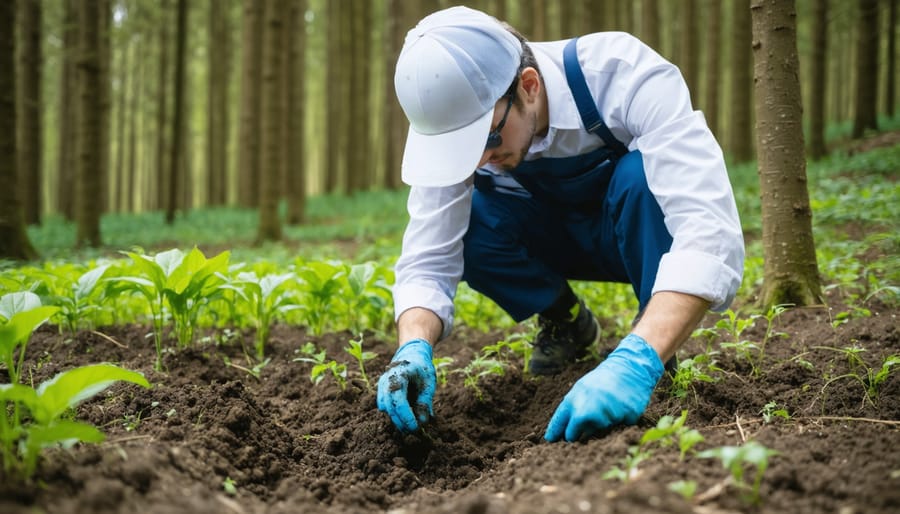
Management and Consulting Roles
Management and consulting roles in agroforestry offer exciting opportunities for experienced professionals to shape sustainable agricultural practices across Alberta and beyond. Project managers typically oversee the implementation of new agroforestry systems, coordinating between landowners, workers, and stakeholders while ensuring projects meet environmental and economic objectives.
Consulting positions are particularly abundant in our region, with experienced agroforesters providing valuable guidance to farmers transitioning to integrated tree-crop systems. These roles typically command salaries ranging from $65,000 to $95,000 annually, with independent consultants often earning more based on their expertise and client base.
Key responsibilities include conducting feasibility studies, developing management plans, and providing technical assistance to farmers and organizations. Many consultants in Alberta specialize in specific areas such as silvopasture systems or indigenous food forests, creating unique niches for themselves in the market.
To succeed in these positions, professionals should combine strong agricultural knowledge with business acumen and excellent communication skills. Industry certifications and a minimum of 5-7 years of practical experience are typically required, though many successful consultants have built their reputation through hands-on farming experience and demonstrated results.
Research and Development Careers
Research and development careers in agroforestry offer exciting opportunities for those passionate about advancing innovative agricultural systems. In Alberta, organizations like Agriculture and Agri-Food Canada and various universities employ researchers, data analysts, and field specialists who study tree-crop interactions, soil health, and biodiversity improvements.
These positions typically require a background in agricultural science, forestry, or environmental studies, with many roles demanding advanced degrees. Research technicians and scientists work on developing climate-resilient practices, optimizing tree species selection, and improving yield predictions. The average salary range for research positions starts at $65,000, with senior scientists earning upwards of $95,000 annually.
Local success stories include the University of Alberta’s agroforestry research team, which has pioneered several breakthrough practices now used by farmers across the prairies.
Skills and Qualifications
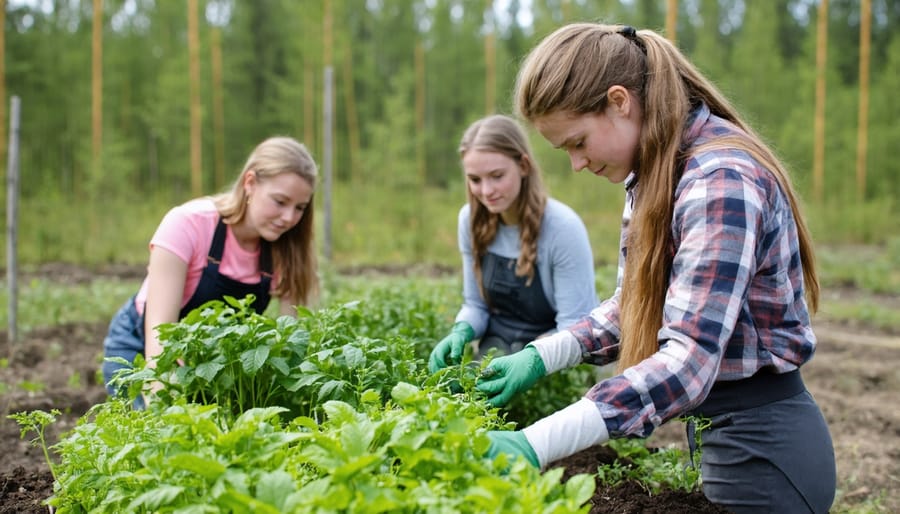
Educational Pathways
In Alberta, several educational pathways can lead to a rewarding career in agroforestry. Olds College offers a comprehensive Agricultural Management diploma with specialization in sustainable resource management, providing hands-on experience in both agriculture and forestry practices.
The University of Alberta’s Faculty of Agricultural, Life & Environmental Sciences offers bachelor’s and master’s degrees in Forest Science and Agricultural Studies, equipping students with the scientific foundation needed for agroforestry careers. These programs combine classroom learning with practical fieldwork at research stations across the province.
For working professionals, the Alberta Institute of Agrologists offers continuing education courses and professional certification. The Agroforestry and Woodlot Extension Society (AWES) provides specialized workshops and certifications focused specifically on agroforestry systems.
Online learning opportunities are also available through institutions like Athabasca University, offering flexible study options for rural residents. Local agricultural societies frequently host workshops and short courses on specific aspects of agroforestry, making education accessible to established farmers looking to diversify their operations.
Industry-recognized certifications in areas such as silvopasture management and shelterbell design can be obtained through organizations like the Canadian Agroforestry Council, enhancing employment prospects in both private and public sectors.
Practical Experience Requirements
Gaining practical experience in agroforestry is crucial for career success in this growing field. Many employers in Alberta require candidates to have hands-on experience before considering them for full-time positions. Internships through organizations like the Canadian Agroforestry Partnership (CAP) and local agricultural societies provide valuable opportunities to learn system design, tree management, and sustainable farming practices.
Students and career changers can benefit from seasonal work experiences on established agroforestry operations, particularly during the spring planting and fall harvest seasons. These positions typically run from 4-8 months and offer comprehensive exposure to different aspects of the industry. The Alberta Green Internship Program, for example, connects aspiring agroforesters with mentors who provide guided learning experiences.
Workshop participation and volunteer opportunities at demonstration farms are excellent ways to build practical skills while networking with industry professionals. Several farms in central and northern Alberta offer structured learning programs ranging from weekend workshops to full-season apprenticeships. These hands-on experiences often include training in soil management, irrigation systems, and integrated livestock management.
For those seeking certification, many technical colleges require a minimum of 500 hours of documented field experience before granting professional credentials. This practical component ensures graduates are well-prepared for the physical and technical demands of agroforestry careers.
Economic Benefits and Career Growth
Salary Expectations
Salaries in Alberta’s agroforestry sector vary significantly based on experience, specialization, and position type. Entry-level positions, such as agroforestry technicians and field workers, typically start between $40,000 and $55,000 annually. Mid-level professionals with 3-5 years of experience, including project managers and research specialists, can expect to earn between $60,000 and $85,000 per year.
Senior positions in agroforestry consulting, management, and research roles often command salaries ranging from $90,000 to $120,000 or more. According to recent industry surveys, professionals with specialized skills in sustainable forest management and integrated agricultural systems tend to earn 15-20% above the baseline for their position level.
Many employers in Alberta offer comprehensive benefits packages, including health insurance, retirement plans, and professional development opportunities. Some positions, particularly those with government agencies or research institutions, may include additional perks such as fieldwork allowances and housing subsidies for remote locations.
Contract and seasonal positions typically offer hourly rates ranging from $20 to $45, depending on the role and required expertise. Self-employed agroforestry consultants can earn varying amounts based on their client base and project scope, with successful consultants reporting annual revenues between $75,000 and $150,000.
The sector has shown steady growth in compensation rates, with an average annual increase of 2.5-3% over the past five years, reflecting the growing importance of sustainable land management practices in Alberta’s agricultural landscape.
Long-term Career Prospects
The future of agroforestry careers in Canada shows remarkable promise, with industry experts projecting substantial growth over the next decade. As climate change concerns intensify, farmers and landowners are increasingly recognizing the value of integrated land management systems, creating new opportunities for skilled professionals in this field.
Emerging roles include specialized consultants who help landowners develop sustainable agroforestry plans and experts who assist with carbon credit opportunities. Technology integration is also creating positions for digital mapping specialists and precision agriculture experts who can optimize tree-crop systems using data analytics.
In Alberta specifically, the growing interest in shelterbelts and silvopasture systems is driving demand for agroforestry practitioners. Government initiatives supporting sustainable agriculture practices are expected to create additional positions in extension services and policy implementation.
Research opportunities are expanding at institutions across Canada, particularly in areas focusing on climate-smart agriculture and indigenous forest management practices. Private sector growth is also notable, with companies seeking specialists in value-added forest products and sustainable resource management.
For those entering the field today, career advancement often involves combining traditional agricultural knowledge with modern environmental management skills. Continuing education and certification programs are becoming increasingly available, offering pathways to senior positions in both public and private sectors.
Success Stories from Alberta
Local Innovation Leaders
Alberta’s agroforestry landscape is enriched by innovative leaders who have transformed traditional farming practices into sustainable success stories. Meet Sarah Thompson, who manages a 200-hectare integrated tree-crop operation near Red Deer. Thompson pioneered a unique silvopasture system that combines black cherry trees with rotational grazing for cattle, creating multiple revenue streams while enhancing soil health.
In the Peace Country region, James McKenzie developed a thriving hybrid poplar plantation interspersed with high-value medicinal herbs. His operation now employs six full-time staff and has become a model for diversified agroforestry income. “The key is thinking long-term while creating immediate revenue sources,” McKenzie explains. “Our medicinal herbs provide annual income while our trees mature.”
Linda White’s story showcases the educational side of agroforestry careers. Based in Lacombe, she transitioned from conventional farming to become an agroforestry consultant, helping other farmers design and implement sustainable systems. Her consulting practice has guided over 50 Alberta farmers in establishing successful agroforestry operations.
Near Edmonton, the Martinez family demonstrates the multigenerational potential of agroforestry careers. Their 160-hectare operation combines Christmas tree production with berry cultivation and bee keeping. “We’ve created three full-time positions for family members,” says Carlos Martinez, “and we hire seasonal workers from the local community.”
These leaders share a common thread: they’ve adapted agroforestry principles to Alberta’s unique climate and market conditions, creating sustainable businesses that benefit both the environment and local economies. Their success stories illustrate the diverse career paths available in modern agroforestry.

Emerging Entrepreneurs
The agroforestry sector in Alberta is witnessing an exciting surge of innovative entrepreneurs who are reshaping traditional farming practices. Take Sarah Henderson, for example, who launched “Prairie Forest Foods” in 2021. Her business combines black walnut cultivation with organic vegetable production on a 40-hectare plot near Red Deer, creating a thriving enterprise that now employs six local workers.
In the Peace River region, brothers Mark and Jason Thomson established “Northern Synergy Farms,” integrating fast-growing hybrid poplar windbreaks with grass-fed cattle operations. Their innovative approach has not only improved soil health but also created additional revenue streams through wood products and carbon credits.
Another success story comes from Linda Martinez, whose “Wild Rose Silvopasture” startup near Lethbridge combines fruit trees, sheep grazing, and honey production. Starting with just 2 hectares in 2020, she has expanded to 15 hectares and now supplies local markets with diverse products year-round.
These entrepreneurs share common success factors: thorough market research, strong business planning, and participation in mentorship programs through local agricultural associations. Many have benefited from Alberta’s Agricultural Development Corporation’s startup funding programs and technical support from established agroforesters.
For aspiring entrepreneurs, these examples demonstrate the viable business opportunities within agroforestry, particularly when combining traditional farming knowledge with innovative sustainable practices.
The agroforestry sector in Canada offers diverse and rewarding career opportunities for those passionate about sustainable agriculture and environmental stewardship. From hands-on roles managing integrated tree-crop systems to research positions developing innovative farming methods, the field continues to expand as more farmers recognize the benefits of agroforestry practices.
For those looking to enter this growing sector, several pathways are available. Consider starting with a diploma or degree in agriculture, forestry, or environmental science from institutions like Olds College or the University of Alberta. Practical experience through internships or apprenticeships on established agroforestry operations can provide valuable hands-on learning opportunities.
Professional organizations like the Canadian Agroforestry Network offer networking opportunities, workshops, and certification programs that can enhance your credentials. Many successful agroforesters in Alberta began by incorporating trees into existing farming operations, gradually expanding their knowledge and systems.
The future of agroforestry jobs looks promising, with increasing demand for specialists in carbon credit management, sustainable agriculture consulting, and ecosystem service assessment. Government initiatives supporting climate-smart agriculture continue to create new positions in both public and private sectors.
Whether you’re a farmer looking to diversify your operation or a student planning your career path, agroforestry offers meaningful work that combines environmental stewardship with economic opportunity. Take the first step by connecting with local agroforestry practitioners and exploring educational programs in your area.



